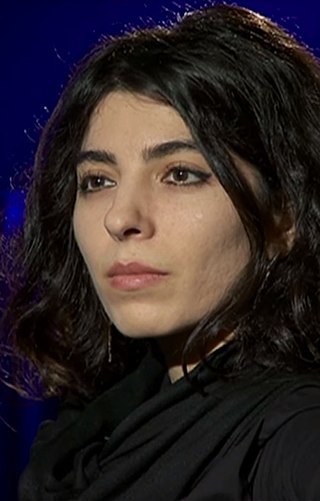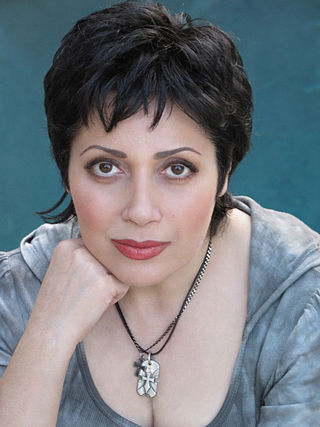Yassamin Maleknasr (also spelled Yasman Malek-Nasr, born 19 May 1955, Tehran, Iran) is an Iranian filmmaker and actress.
Yassamin Maleknasr (also spelled Yasman Malek-Nasr, born 19 May 1955, Tehran, Iran) is an Iranian filmmaker and actress.
Yassamin Maleknasr is the first Iranian woman filmmaker to graduate from the University of Southern California (USC) in Film and Television Production.[ when? ][ citation needed ] She did post-graduate work in Drama at Towson State University in Maryland.[ when? ][ citation needed ]
She made her first short film, Jazz Ballet in the U.S.; then after several years working at American film companies, she returned to Tehran to perform in Dariush Mehrjui's film Sara (1993) for which she won a "Best Supporting Actress" award from the Fajr International Film Festival in Tehran. She has also acted in a number of other Iranian features.
In 1995, Maleknasr directed and acted in her first feature film, "Common Plight".[ citation needed ]
In 2002, she took a journey with a small crew throughout war-torn Afghanistan and traveled more than 3,000 miles by land to make her acclaimed film, “Afghanistan the Lost Truth”. [1] Her recent lyrical documentary, "Women of the Silk Road", depicts the lives of four women from four countries of the Silk Road is an exploration of women’s lives today via textile along the ancient trade route. Shot in Iran, Turkey, Oman, and Tajikistan. A story of love, courage, and hope.[ citation needed ]
Her films have been screened at various networks such as Arte, France and Ireland, BBC, Australian, and New Zealand networks, TVC Spain, USHUAIA France, plus special screenings at the Screen Actors Guild – Los Angeles, United Nations – New York, World Bank – Washington DC, the United States Senate, and many universities across the United States. [2]

Samira Makhmalbaf is an Iranian filmmaker and screenwriter. She is the daughter of Mohsen Makhmalbaf, the film director and writer. Samira Makhmalbaf is considered to be part of the Iranian New Wave.

The Cinema of Iran, also known as the Cinema of Persia, refers to the cinema and film industries in Iran which produce a variety of commercial films annually. Iranian art films have garnered international fame and now enjoy a global following. Iranian films are usually written and spoken in the Persian language. Iranian cinema has had many ups and downs.

Jafar Panâhi is an Iranian film director, screenwriter, and film editor, commonly associated with the Iranian New Wave film movement. After several years of making short films and working as an assistant director for fellow Iranian filmmaker Abbas Kiarostami, Panahi achieved international recognition with his feature film debut, The White Balloon (1995). The film won the Caméra d'Or at the 1995 Cannes Film Festival, the first major award an Iranian film won at Cannes.

Euzhan Palcy is a Martinican-born film director, screenwriter, and producer. Her films are known to explore themes of race, gender, and politics, with an emphasis on the perpetuated effects of colonialism. Palcy's first feature film Sugar Cane Alley (1983) received numerous awards including the César Award for Best First Feature Film. For directing A Dry White Season (1989), she became the first black female director to have a film produced by a major Hollywood studio, that being by MGM.

Hana Makhmalbaf is an Iranian filmmaker. She is the younger sister of filmmaker Samira Makhmalbaf and daughter of filmmakers Mohsen Makhmalbaf and fatemeh meshkini. She is known for her films, Joy of Madness (2003),Buddha Collapsed Out of Shame (2007) and Green Days (2009). Makhmalbaf won the Lina Mangiacapre Award at the Venice Film Festival in 2003 for Joy of Madness (2003). Joy of Madness also won the Special Jury Prize at Tokyo Filmex. Makhmalbaf's film Buddha Collapsed Out of Shame won various awards as well, such as the Paolo Ungari UNICEF Prize from the Rome Film Festival and the Peace Film Award at the Berlin International Film Festival.

Shabnam Toluei is an Iranian actress, theatre director and playwright. She is currently forbidden from working in Iran by the government because of her religion, the Baháʼí Faith, which is subject to state sanctioned persecution. Since December 2004 she is living in Paris, France. and became naturalized French citizen in 2019.

Rosie Malek-Yonan is an Assyrian-American actress, author, director, public figure and activist. Malek-Yonan became a noted pianist at an early age. Having graduated from the University of Cambridge, she settled in the United States, where she pursued a career in music and dramatic arts. As an actress she appeared in well over 30 films and television series, including Up Close & Personal (1996) and Rendition (2007), as well as, among others, Dynasty, CSI: Miami, JAG, ER and Babylon 5.

Tahmineh Milāni is an Iranian feminist activist, film director, and producer. She is the wife of the Iranian actor and producer Mohammad Nikbin..

Asghar Farhadi is an Iranian film director and screenwriter. He has received critical acclaim for his international films which focus on the human condition as well as portray intimate and challenging stories of internal family conflicts. His films include the dramas About Elly (2009), A Separation (2011), The Past (2013), The Salesman (2016), Everybody Knows (2018), and A Hero (2021).

Marzieh Meshkini is an Iranian cinematographer, film director and writer. She is married to filmmaker Mohsen Makhmalbaf, who wrote the script for her debut film The Day I Became a Woman.

Cinema was introduced in Afghanistan at the beginning of the 20th century. Political troubles slowed the indusry over the years. However, numerous Pashto and Dari films have been made both inside and outside Afghanistan throughout the 20th century. The cinema of Afghanistan entered a new phase in 2001, but has failed to recover to its popular pre-war status.
Nasr is a given name and surname, more common as a surname, in the Arabic language. It may refer to:

Mania Akbari is an Iranian filmmaker, artist, writer and actress whose works explore women's rights, marriage, sexual identity, disease and body image. Her style, in contrast to the long tradition of melodrama in Iranian cinema, is rooted in the visual arts and autobiography. Because of the taboo themes frankly discussed in her films and her opposition to censorship, she is considered one of the most controversial filmmakers in Iran. As an actress, she is probably best known for playing the lead role in Abbas Kiarostami's Ten (2002).

Rakhshān Banietemad is an internationally and critically acclaimed Iranian film director and screenwriter who is widely considered a premier female director and her films have been praised at international festivals as well as being popular with Iranian critics and audiences. Her title as "First Lady of Iranian Cinema" is not only a reference to her prominence as a filmmaker, but also connotes her social role of merging politics and family in her work. Her signature style is that she focuses on a character that is the representation of a part of the society in order to explore it while staying objectively neutral. The first period of Banietemad's cinematic activity originates from a kind of dark humor, but in the second period of her work, dark humor gives way to serious and influential films, and deeper and broader issues are addressed. Banietemad has a more realistic view of life.
Malek Shafi’i is a film director, producer, festival organiser, and human rights activist from Afghanistan.

Niku Kheradmand was an Iranian actress and film dubber. She died in a Tehran hospital on 17 November 2009, aged 77. Kheradmand had suffered a heart attack several months earlier.

Kamshad Kooshan is an Iranian-born American actor, film director, screenwriter, film producer, and educator.

Soudabeh Moradian is an Iranian-American independent filmmaker. A number of her movies have been in official selection of various international film festivals and many of them won awards. She has made many documentary series about Iranian rural women, and some independent documentaries about "war and madness" such as "Doomsday Machine"," Story Of The Land On Ashes","Mahin", "Voices Against Them" and some other narrative and docufiction films and series like "The Leader of Caravan","My Name Is Tomorrow" and "Les Chroniques d'iran". She made her first full feature-length narrative called Polaris in 2014 in Los Angeles and Seattle starring Bahram Radan, Alicja Bachleda, Elisabeth Röhm and Coby Ryan McLaughlin. The subjects of her movies are mainly based on social issues, women and psychological impacts of war.

Mahnaz Mohammadi is an Iranian filmmaker and women's rights activist. She wrote and directed her first film in 2003, "Women Without Shadows", depicting the lives of homeless and abandoned women in a state-run shelter, has been shown and awarded in several international film festivals.